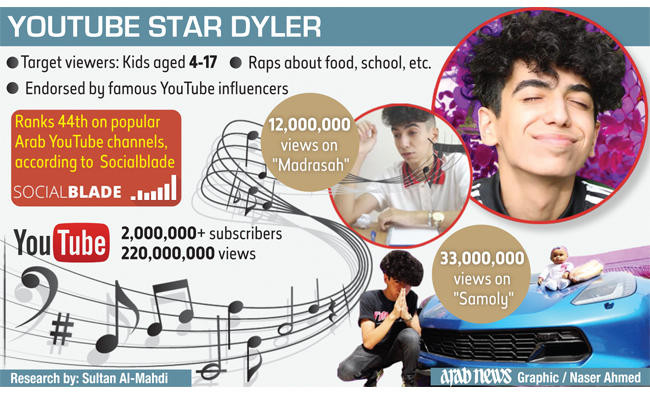RIYADH: A well-known YouTuber in Saudi Arabia described the magical recipe that allowed the videos of the young rapper Abdul Aziz Rabih Al-Dulaijan, known as “Dyler” to reach 220 million views on his YouTube channel in a period of 11 months, a “smart” investment by the followers who are children and love the repetition of the same verses.
Dyler’s close YouTuber friend, who refused to disclose his name for personal reasons, said that 16-year-old Dyler, who created his YouTube channel less than a year ago in Riyadh, has achieved his great success according to a pre-studied plan, describing the YouTube revolution happening today as a virus that suddenly spreads and is hard to deal with.
His friend told Arab News that Dyler and other YouTubers are getting millions of views because their videos include repetition, which amazes children.
Dyler’s song “Madrasa” (school) alone had 10 million views in the first 10 days. His friend said that despite the poor quality of the picture and content, the song is a big success, due to its harmonization which appeals to kids between four and 17 years old.
He described Dyler’s choice of songs about school and allowance a “smart” one as it interests a wide section of teenagers and kids.
A modern media professor at Umm Al-Qura University, Ousama Madani, told Arab News that YouTube is one of the world’s most widespread and most common social media platforms as it allows people to react to videos, share their ideas and showcase their talents. During the past five years, YouTubers have become more popular in the Arab world, he added. “One of the reasons behind Dyler and other YouTubers’ successes is the great support provided by advertising agencies directly without an intermediary company like Google AdSense,” he added.
Saudi YouTubers have achieved greater success than other Arabs on the platform because the Saudi experience is a unique one that provides a greater diversity of content (entertainment, social, political), said Madani.
He added that a phenomenon like Dyler performing rap usually creates controversy on social media until a new phenomenon appears and spreads among youths.
Decoding Dyler: Saudi YouTube sensation raps his way to success
Decoding Dyler: Saudi YouTube sensation raps his way to success











